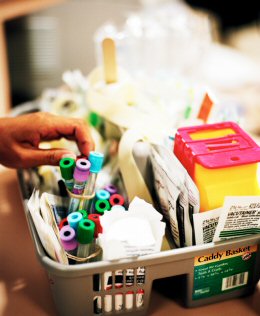

Home Page
The latest articles, features and news.


Read About...


Search Articles



Discussion Forums




|
| | |
|
13 June 2005
Chemical In Plastic Medical Equipment Associated With Reproductive Problems
by George Atkinson  Harvard School of Public Health researchers have found that infants in neonatal intensive care units whose treatment involved the use of medical devices containing phthalates, had high levels of phthalates in their bodies. The study, appearing in Environmental Health Perspectives, also found a direct relationship between phthalate levels and the frequency at which phthalate-containing medical devices were used in the infants' treatment. Phthalates have been shown to be associated with disruption of reproductive tract development and function following in-utero or early lifetime exposure.
Harvard School of Public Health researchers have found that infants in neonatal intensive care units whose treatment involved the use of medical devices containing phthalates, had high levels of phthalates in their bodies. The study, appearing in Environmental Health Perspectives, also found a direct relationship between phthalate levels and the frequency at which phthalate-containing medical devices were used in the infants' treatment. Phthalates have been shown to be associated with disruption of reproductive tract development and function following in-utero or early lifetime exposure. Phthalates are used to soften polyvinyl chloride (PVC). They are found in a range of medical products and devices used in neonatal intensive care units, including examination gloves, bags containing blood, plasma, intravenous fluids and tubing and other products. In PVC plastic, phthalates readily migrate out of the plastic into blood and fat-containing solutions in contact with the plastic, a phenomenon observed with blood stored in PVC bags. Phthalates may also migrate out of the plastic into the body from catheters and tubing used in medical treatments. The study found that the levels of phthalates in the infants' urine were many times higher than those observed in other studies of children and adults. Moreover, there was a direct relationship between urinary phthalate levels and the intensiveness of medical product use. "Our study not only demonstrates that infants in the neonatal intensive care unit are exposed to demonstrably high levels of DEHP [phthalates], but we have also clearly linked the intensity of DEHP product use with the amount of DEHP that enters infants' bodies," said principal investigator Howard Hu. While the researchers noted that the use of these medical products was often lifesaving for neonatal intensive care unit infants, there were alternative products available that contain little or no phthalates, and they suggested that intensive care unit administrators should consider a transition to their use.
|
|





